It looks like you're using an Ad Blocker.
Please white-list or disable AboveTopSecret.com in your ad-blocking tool.
Thank you.
Some features of ATS will be disabled while you continue to use an ad-blocker.
share:
a reply to: FlyingFox
A voice from Africa has reached out! Finally.
Afribundance has a report about the Malaria vaccine and the genetically modified insects being bred by bill Gates.
The implications are rather startling at least for me because I just can't imagine such a diabolical plan. On the surface the mosquito plan looks promising but now they are super mosquitoes and the vaccine is only 30% effective against it.
I'm going to be following more from Afribundance because they are digging in more deeply over the Climate Change scam and the carbon offset.
Bill Gates has invested in mosquitoes and low efficacy malaria vaccines
The only way we will understand what is happening in Africa is reports from the people themselves. This group is struggling to educate their people and not many are following them. Hopefully we can help out.
A voice from Africa has reached out! Finally.
Afribundance has a report about the Malaria vaccine and the genetically modified insects being bred by bill Gates.
The implications are rather startling at least for me because I just can't imagine such a diabolical plan. On the surface the mosquito plan looks promising but now they are super mosquitoes and the vaccine is only 30% effective against it.
I'm going to be following more from Afribundance because they are digging in more deeply over the Climate Change scam and the carbon offset.
Bill Gates has invested in mosquitoes and low efficacy malaria vaccines
The only way we will understand what is happening in Africa is reports from the people themselves. This group is struggling to educate their people and not many are following them. Hopefully we can help out.
Another voice from Africa 100 percent fed up.
Wow. Just wow.
Gates Foundation Donates Millions to NGO That Seeks to Normalize Child Prostitution and Sexualization of Children Under 10
Here we have the International Planned Parenthood mixed up in all of this. just wondering why they are so anxious to promote this when the agenda has been about reducing the population. Maybe this has something ore to do with Billy the jab investor HPV jabs.
Checking in with the NIH library.
HPV Vaccination in Kenya
There it is. They want to incorporate it into the routine immunization schedule starting with girls 10 years old.
No doubt these HPV jabs probably have adverse side effects and when does it not include cancer.
Wow. Just wow.
Gates Foundation Donates Millions to NGO That Seeks to Normalize Child Prostitution and Sexualization of Children Under 10
Here we have the International Planned Parenthood mixed up in all of this. just wondering why they are so anxious to promote this when the agenda has been about reducing the population. Maybe this has something ore to do with Billy the jab investor HPV jabs.
Checking in with the NIH library.
HPV Vaccination in Kenya
There it is. They want to incorporate it into the routine immunization schedule starting with girls 10 years old.
No doubt these HPV jabs probably have adverse side effects and when does it not include cancer.
If Q is a repeat of Operation Trust than whoever came to that conclusion is openly admitting that our current government is a highly corrupt regime
that is using a counterterrorist operation to weed out dissenters. Just like the Bolsheviks did.
en.m.wikipedia.org...
This is the state of our current government. The Constitution is dead.
The Bolsheviks (Russian: Большевики́, IPA: [bəlʲʂɨvʲɪˈkʲi], from большинство́ boľšinstvó, 'majority')[a] were a far-left, revolutionary Marxist faction founded by Vladimir Lenin that split with the Mensheviks from the Marxist Russian Social Democratic Labour Party (RSDLP), a revolutionary socialist political party formed in 1898, at its Second Party Congress in 1903.[3]
en.m.wikipedia.org...
This is the state of our current government. The Constitution is dead.
You can claim that Q is fake but you can't explain away Epstein
JPMorgan CEO Jamie Dimon faces deposition in Jeffrey Epstein lawsuits
www.cnbc.com...
Why would the cabal use Epstein of all people to ensnare the opposition? Out of all the crumbs that were left, Epstein has been the one piece of the puzzle that has captured the attention of not just Q researchers but the entire world. Because his lurid activities were real. And so was his island. Epstein won't go away. Even after they thought they buried him, he keeps resurfacing, rearing his ugly head. Have you ever read Tell Tale Heart?
You can't make the claim that Epstein was fake. Which means maybe there are aspects of Q that are true. Which is why it has simply been slapped with a disclaimer.
JPMorgan CEO Jamie Dimon faces deposition in Jeffrey Epstein lawsuits
JPMorgan Chase CEO Jamie Dimon was set to be deposed Friday at his bank's New York headquarters for lawsuits that accuse the company of facilitating and profiting from sex trafficking by its long-time customer Jeffrey Epstein.
The suits claim that JPMorgan, the biggest bank in the United States, kept Epstein as a customer even after learning he was being investigated for sexually abusing underage girls in Florida and after he pleaded guilty in a state charge there in 2008 to paying for sex from a minor.
www.cnbc.com...
Why would the cabal use Epstein of all people to ensnare the opposition? Out of all the crumbs that were left, Epstein has been the one piece of the puzzle that has captured the attention of not just Q researchers but the entire world. Because his lurid activities were real. And so was his island. Epstein won't go away. Even after they thought they buried him, he keeps resurfacing, rearing his ugly head. Have you ever read Tell Tale Heart?
You can't make the claim that Epstein was fake. Which means maybe there are aspects of Q that are true. Which is why it has simply been slapped with a disclaimer.
a reply to: socialmediaclown
For being a disinformation campaign there sure was a lot of good information. I'm sure all good disinformation artists speak like this:

and this

and this

twitter link
and this
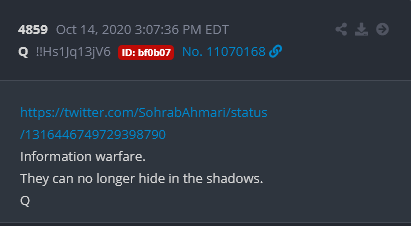
twitter link
For being a disinformation campaign there sure was a lot of good information. I'm sure all good disinformation artists speak like this:

and this

and this

twitter link
and this

twitter link
edit on 5/26/2023 by OveRcuRrEnteD because: psshh
Germany, Europe's largest economy, hits recession as inflation hits consumers
www.amp.abc.net.au...
Germany’s coalition parties come to blows over budget cuts, delay to energy law
www.politico.eu...
The German economy has entered a recession which started in early 2023 after household spending in Europe's economic engine finally succumbed to the pressure of high inflation.
Under the weight of immense inflation, the German consumer has fallen to his knees, dragging the entire economy down with him," said Andreas Scheuerle, an analyst at DekaBank.
www.amp.abc.net.au...
Germany’s coalition parties come to blows over budget cuts, delay to energy law
Germany’s three-party ruling coalition descended into public infighting on Tuesday as the Greens’ Vice Chancellor Robert Habeck accused the liberal Free Democrats of Finance Minister Christian Lindner of breaking promises by delaying a controversial green energy law.
Habeck also attacked a plan by Lindner to enforce painful cuts of up to €22 billion in next year’s budget and warned that Germany faced “major [financial] needs everywhere, especially in the areas of decarbonization and digitalization.”
The spat highlights growing tensions in the government of Social Democratic Chancellor Olaf Scholz, who is leading a coalition with the Greens and the Free Democratic Party (FDP).
The parties hold diverging opinions over how Germany should implement the EU’s green plans to slash carbon emissions by 55 percent by 2030 and become climate neutral by 2050. That green energy dispute is complicated by a shortfall in tax income, which reduces the financial leeway to subsidize the shift to renewable energies.
At the core of the spat is a new energy law for buildings, which aims to phase out gas and oil heating in German households by requiring that, as of next year, any newly installed heating system in Germany must run 65 percent on renewable energy. That idea is highly controversial owing to its costs, as the most viable option to hit this green energy target is a heat pump, which costs around €20,000 more than a classic gas boiler.
www.politico.eu...
a reply to: OveRcuRrEnteD
It doesn't matter anymore. Things are about to change exponentially for the entire planet. A lot of people are going to be scrambling for answers.
It doesn't matter anymore. Things are about to change exponentially for the entire planet. A lot of people are going to be scrambling for answers.
a reply to: socialmediaclown
Agreed. I'll keep posting Q's disinformation though to inform people of Operation Trust. I feel obligated now.
Agreed. I'll keep posting Q's disinformation though to inform people of Operation Trust. I feel obligated now.
Visa, Microsoft and others join Brazilian CBDC pilot
cointelegraph.com...
Binance sets foot in southeast Asia, collaborates with Gulf Energy in Thailand
Battle for digital asset market dominance
crypto.news...
Both national and global companies will participate in the upcoming Brazilian central bank digital currency (CBDC) pilot project. Banco Central do Brasil, the country’s central bank, will begin adding participants to the digital real platform around the middle of June 2023.
On May 24, the central bank published the final list of CBDC pilot participants. Participants were chosen from a pool of 36 bids made by single companies and consortia, “totaling more than 100 institutions”. The final number of participants is 14; however, some represent groups of companies. For example, the United States-based tech giant, Microsoft; Brazil-based bank, Banco Inter; and the digital technology company, 7COMm, comprise one of the 14 participants.
Among other participants are Visa, Santander, and several Brazilian banking institutions, such as Itaú Unibanco, BTG Pactual and Banco Bradesco.
With a population of 214 million, the largest country in Latin America remains a location of attraction for global crypto companies. In January, Binance and Mastercard teamed up to launch a prepaid crypto card in the country. Since March, Coinbase has partnered with local payment providers to offer crypto purchases, and enable deposits and withdrawals in the local currency. On May 19, the central bank granted Latam Gateway — the payment provider for Binance in Brazil — a license to operate as a payment institution and electronic money issuer.
cointelegraph.com...
Binance sets foot in southeast Asia, collaborates with Gulf Energy in Thailand
The world’s largest crypto exchange Binance has acquired the first license to expand its business to Southeast East through a joint venture with Gulf Energy that starts in Q4 2023.
The digital asset market in Thailand is likely to change due to the arrival of the top cryptocurrency in the world in trading volume.
The Securities and Exchange Commission of Thailand on May 26 ratified the joint operations between Binance and Gulf Energy development to run a digital asset and brokerage exchange. The license is the first the exchange has achieved in Southeast Asia.
Battle for digital asset market dominance
Binance’s debut in Thailand will likely change the prospects of the digital asset market in the area. Bitkub, a local exchange in Thailand, currently holds the lion’s share of digital assets in Thailand at 75.4%, with Zipmex coming at a far second battling the collapse of the Terra Luna crash in mid-2022.
crypto.news...
Some Random Thoughts...
Agreed, Epstein is a problem for the "Q is a larp folks" as is Ukraine. Both where non starters before the process started, now both are in the mainstream, with the mainstream simply Parroting back the reveals of Anons = facts. Q is a tool, nothing more nothing less, but at this point the process is far too complex and requires a very evolved POV to understand = it is too late to get it even if you wanted to try.
Why? Because the entire planetary reality changed, and what Q was, or Anons, is no longer the same. More below.
Onward to more random thoughts.
In the early days of the thread there was some cartoon character here of the devoted "Anarchist" crew and I found the whole contribution hilarious. I cannot understand why the Anarchists do not move to a place where there is Anarchy? Lagos, Chad, to name two. Just move to a place where you will be comfortable, like the Favelas in Brazil for example. They never do, neither to the "merica ta damn racist" people of color not colored people. South Africa looks to be both Anarchy AND BLM friendly now.
Move. Be comfortable. Why does your happiness require me to devolve and turn into a homeless begging barter jabroni for you to be comfortable?
It is odd that usually middle something folks with a high speed internet connection want it all to go to hell, yet they cannot in granular detail share how they will get internet service, power, food, IPA's, Starbucks, and meds in that world.
They also, foolishly, think they will be the top dog in Mad Max's world, but in fact they'll be nothing - those begging for Anarchy as a solution to their emotional problems will be the most marginalized in the world they crave - prove me wrong and move to the Favelas and thrive. There is always destroying their OWN home first, show us how it's done, kind of like the homelessness that is all the Anarchy Rage now and TicTok the entire thing: "I'm an Anarchist, I'm destroying my computer and home, closing my bank account, no car because gasoline, on the streets with a tent to urban camp... so follow me on TikToc for the glory that is living in Anarchy."
What is beyond funny, really effing funny, is the those that really crave cultural, political, moral and social Anarchy claim to understand the Stalin/Mao tactics to perfection...
Onward to more random thoughts...
Let me see if I can illuminate some aspects of the Q effect and the Great Awakening effect.
We all know what Agenda21 was supposed to be. We all should know Agenda21 turned into Agenda30 when Joe took office. We all have seen recently Agenda21/30 became AgendaRightFNow!
What changed? I thought according to the experts it was a fait accompli, NWO wins, always wins cause something something victims.
I've said often that Team Joe came in and went back to 2010 as if nothing ever happened, but they found the controls no longer worked in the same way. What changed? I thought it was a done deal, NWO, no hopium, we all are just victims of a conspiracy.
It doesn't take much to change the course, Informed Consent ALWAYS trumps Implied. See Crankyfiles for more.
Worth noting, Agenda21 meant 500m people, all slaves living in city-cages, A.I. doing the work, elite in charge etc. What do we see now? The REAL version, was BorgVerse, not the Agenda21 version Lite, and with all the components strewn on the floor in a disorganized fashion for all to see - as per the Awakening reQuirements.
So let's look at this through the economic lens.
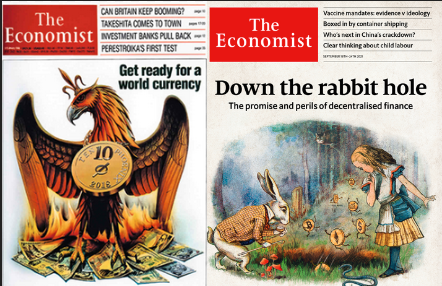
Folks did a nice job decoding these very important covers, what they reveal is what WAS the NWO plan, and within that plan were lots of events, and some of those events were required for other events to occur = required, as in no option. We've seen how important dates, numbers, symbols are, so these above are symbols of great importance.
We shined the light on Tether and BTC crashing, which was part of the NWO problem reaction solution plan. It was integrated into it, but because we all over the web shined the light on it, it changed. Which means the Solutions changed.
They needed to be at certain times as well. Shining the light on this NWO version of the polarity caused it to change, it means, by definition that some of those events will not happen as planned.

This in turn changes things, which in turn changes things and so on.
How do we know the NWO Plan is in free-fall?
Easy. Back to Agenda21 > Agenda30, which is now AgendaHURRYTheFUp.
If it was hard fact, Agenda2021 would be it. It was not, and is not. So things changed, which means things are in fact in flux. I mentioned a bit ago that dates aren't going to be a thing any longer, cannot be, why? Because the NWO version's counter, the Liberation Version, is viable, hence Agenda/whenever.
What will emerge? Tough to say, the emerging tools were created by the NWO version, which, is in chaos, see BRICS+Vlad+SA etc. not supporting the Old Guard NWO version which they were meant to do. What has happened to date with BRICS and Ukraine assures no going back, it also assures us the Hijack Jacked things and events will be very different then perceived in 1988 and 2016 etc.
FFS, we can see the plans, they are out in the open now, hell Klaus Blofeld is on effing teeeveee now, not hiding in the shadows. We can see what they wanted, and we can see when they wanted it, and we can see the two do not match up. What changed?
Which brings me back. Many folks are awakening at levels not this aware. They cannot do things but point out stuff like "oh, the masons control everything..." and could not even begin to comprehend what this means...
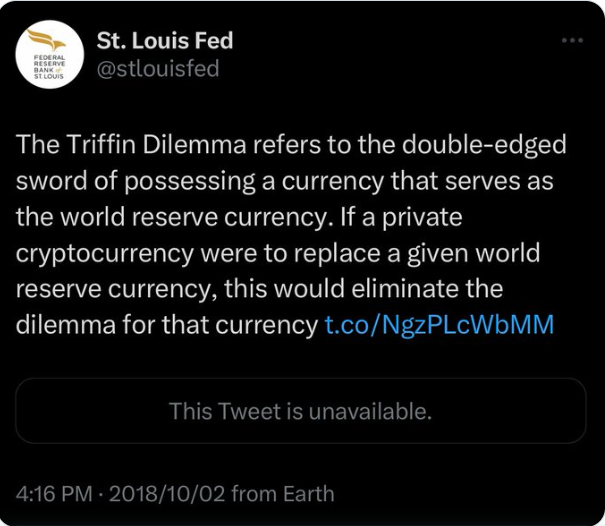
And Or This...
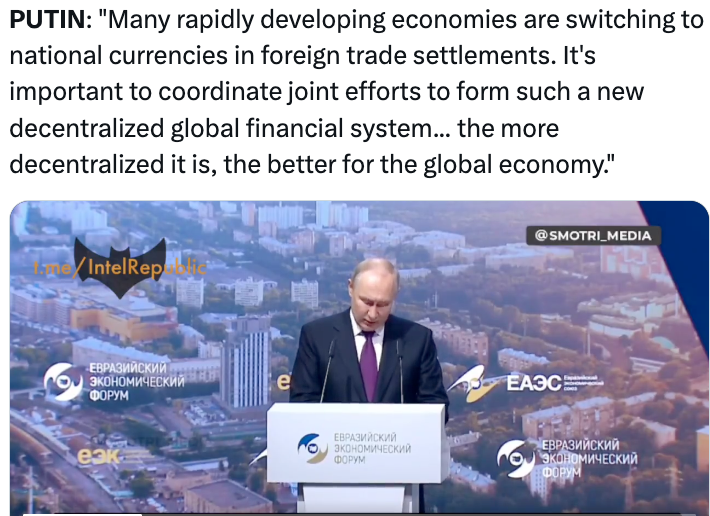
In short, what this means is NOTHING will ever be going backward, NOTHING. Not gonna happen. Ask folks "okay, fine, given the BRICS+ is a thing, the Dollar is not, give me granular details on how we go backward..." Crickets are assured. See folks are barflies, most have no clue how anything works but the damn sure know how to fix the things - Bernie Effing Sanders and such.
Assuming for a second there were 8 billion living, breathing human souled beings, +countless animals, +countless insects, +countless plants, +countless fish, +, how the actual F can a teen age girl with emotional problems decide they know how to change all of that without unintended consequences, and demand X?

Polarity Realities are what they are. For the NWO version exist, CONTRAST must be present in equal measure. That's a GD fact that cannot be changed or altered. That force is the Liberation version. Both are equal until 49/51 or 51/49 and that is a GD fact too.
51 was reached a while ago, I'll let you decide which one you want to enter. Regardless, the facts are, the world changed since 2016, the Old Guard/Ukraine is dead but they are still fighting. This can be easily seen in this graphic.
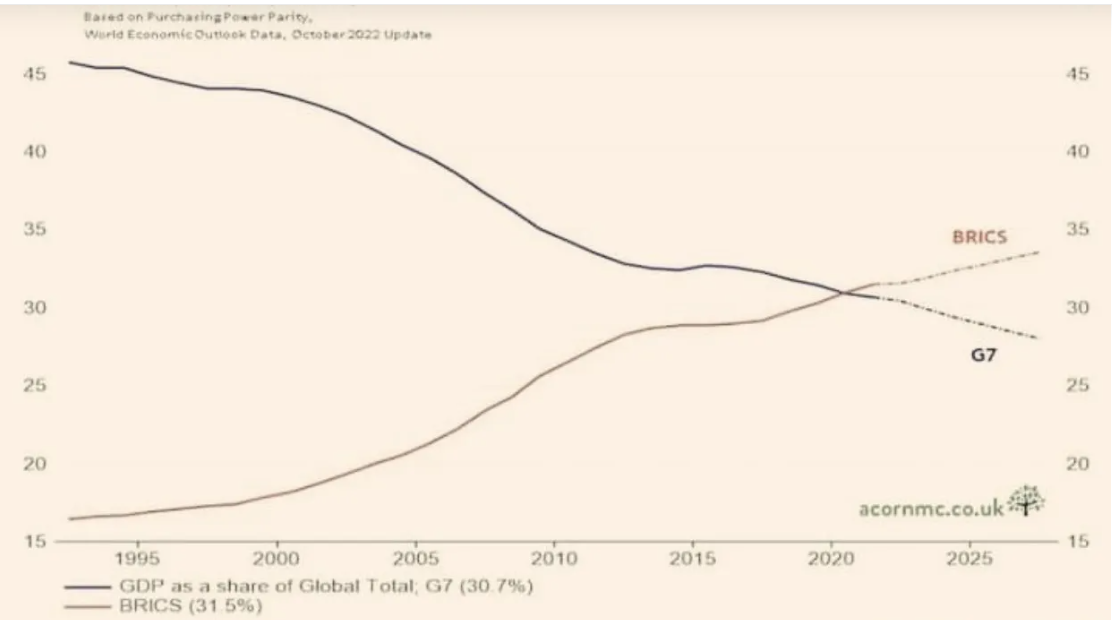
BTW, BRICS+ will not be going green. So that's dead.
Is the exposure complete? I mean Team Joe, Ukraine, JE/Gmax, FBI, Twitter, Jab, BLM/Broke, etc. are exposed, isn't that enough? Not done, more to come.For many that no longer matters, more FBI or CIA exposure really makes no difference, as I have said 1000x here or more, everyone is their own guide and nothing holds them back but themselves, another GD Fact.
You already chose

Agreed, Epstein is a problem for the "Q is a larp folks" as is Ukraine. Both where non starters before the process started, now both are in the mainstream, with the mainstream simply Parroting back the reveals of Anons = facts. Q is a tool, nothing more nothing less, but at this point the process is far too complex and requires a very evolved POV to understand = it is too late to get it even if you wanted to try.
Why? Because the entire planetary reality changed, and what Q was, or Anons, is no longer the same. More below.
Onward to more random thoughts.
In the early days of the thread there was some cartoon character here of the devoted "Anarchist" crew and I found the whole contribution hilarious. I cannot understand why the Anarchists do not move to a place where there is Anarchy? Lagos, Chad, to name two. Just move to a place where you will be comfortable, like the Favelas in Brazil for example. They never do, neither to the "merica ta damn racist" people of color not colored people. South Africa looks to be both Anarchy AND BLM friendly now.
Move. Be comfortable. Why does your happiness require me to devolve and turn into a homeless begging barter jabroni for you to be comfortable?
It is odd that usually middle something folks with a high speed internet connection want it all to go to hell, yet they cannot in granular detail share how they will get internet service, power, food, IPA's, Starbucks, and meds in that world.
They also, foolishly, think they will be the top dog in Mad Max's world, but in fact they'll be nothing - those begging for Anarchy as a solution to their emotional problems will be the most marginalized in the world they crave - prove me wrong and move to the Favelas and thrive. There is always destroying their OWN home first, show us how it's done, kind of like the homelessness that is all the Anarchy Rage now and TicTok the entire thing: "I'm an Anarchist, I'm destroying my computer and home, closing my bank account, no car because gasoline, on the streets with a tent to urban camp... so follow me on TikToc for the glory that is living in Anarchy."
What is beyond funny, really effing funny, is the those that really crave cultural, political, moral and social Anarchy claim to understand the Stalin/Mao tactics to perfection...
Onward to more random thoughts...
Let me see if I can illuminate some aspects of the Q effect and the Great Awakening effect.
We all know what Agenda21 was supposed to be. We all should know Agenda21 turned into Agenda30 when Joe took office. We all have seen recently Agenda21/30 became AgendaRightFNow!
What changed? I thought according to the experts it was a fait accompli, NWO wins, always wins cause something something victims.
I've said often that Team Joe came in and went back to 2010 as if nothing ever happened, but they found the controls no longer worked in the same way. What changed? I thought it was a done deal, NWO, no hopium, we all are just victims of a conspiracy.
It doesn't take much to change the course, Informed Consent ALWAYS trumps Implied. See Crankyfiles for more.
Worth noting, Agenda21 meant 500m people, all slaves living in city-cages, A.I. doing the work, elite in charge etc. What do we see now? The REAL version, was BorgVerse, not the Agenda21 version Lite, and with all the components strewn on the floor in a disorganized fashion for all to see - as per the Awakening reQuirements.
So let's look at this through the economic lens.

Folks did a nice job decoding these very important covers, what they reveal is what WAS the NWO plan, and within that plan were lots of events, and some of those events were required for other events to occur = required, as in no option. We've seen how important dates, numbers, symbols are, so these above are symbols of great importance.
We shined the light on Tether and BTC crashing, which was part of the NWO problem reaction solution plan. It was integrated into it, but because we all over the web shined the light on it, it changed. Which means the Solutions changed.
They needed to be at certain times as well. Shining the light on this NWO version of the polarity caused it to change, it means, by definition that some of those events will not happen as planned.

This in turn changes things, which in turn changes things and so on.
How do we know the NWO Plan is in free-fall?
Easy. Back to Agenda21 > Agenda30, which is now AgendaHURRYTheFUp.
If it was hard fact, Agenda2021 would be it. It was not, and is not. So things changed, which means things are in fact in flux. I mentioned a bit ago that dates aren't going to be a thing any longer, cannot be, why? Because the NWO version's counter, the Liberation Version, is viable, hence Agenda/whenever.
What will emerge? Tough to say, the emerging tools were created by the NWO version, which, is in chaos, see BRICS+Vlad+SA etc. not supporting the Old Guard NWO version which they were meant to do. What has happened to date with BRICS and Ukraine assures no going back, it also assures us the Hijack Jacked things and events will be very different then perceived in 1988 and 2016 etc.
FFS, we can see the plans, they are out in the open now, hell Klaus Blofeld is on effing teeeveee now, not hiding in the shadows. We can see what they wanted, and we can see when they wanted it, and we can see the two do not match up. What changed?
Which brings me back. Many folks are awakening at levels not this aware. They cannot do things but point out stuff like "oh, the masons control everything..." and could not even begin to comprehend what this means...

And Or This...

In short, what this means is NOTHING will ever be going backward, NOTHING. Not gonna happen. Ask folks "okay, fine, given the BRICS+ is a thing, the Dollar is not, give me granular details on how we go backward..." Crickets are assured. See folks are barflies, most have no clue how anything works but the damn sure know how to fix the things - Bernie Effing Sanders and such.
Assuming for a second there were 8 billion living, breathing human souled beings, +countless animals, +countless insects, +countless plants, +countless fish, +, how the actual F can a teen age girl with emotional problems decide they know how to change all of that without unintended consequences, and demand X?

Polarity Realities are what they are. For the NWO version exist, CONTRAST must be present in equal measure. That's a GD fact that cannot be changed or altered. That force is the Liberation version. Both are equal until 49/51 or 51/49 and that is a GD fact too.
51 was reached a while ago, I'll let you decide which one you want to enter. Regardless, the facts are, the world changed since 2016, the Old Guard/Ukraine is dead but they are still fighting. This can be easily seen in this graphic.

BTW, BRICS+ will not be going green. So that's dead.
Is the exposure complete? I mean Team Joe, Ukraine, JE/Gmax, FBI, Twitter, Jab, BLM/Broke, etc. are exposed, isn't that enough? Not done, more to come.For many that no longer matters, more FBI or CIA exposure really makes no difference, as I have said 1000x here or more, everyone is their own guide and nothing holds them back but themselves, another GD Fact.
You already chose

World Economic Forum Paves Way for Global Crypto-Asset Regulation
blockchain.news...
XRP Recognized By Atlanta Fed Reserve Bank As Global Payment Solution
www.bitcoinist.com...
The World Economic Forum (WEF) recently published a white paper titled "Pathways to the Regulation of Crypto-Assets: A Global Approach," advocating for a collaborative approach towards crypto regulation on a global scale.
The white paper highlights the unique challenges and necessary considerations regarding the regulation of crypto-assets. Considering the borderless, open-source, decentralized nature of these digital currencies, their regulation requires a delicate balance between preventing harm, protecting users, and promoting innovation.
The white paper concludes that a global approach to regulating crypto-assets is ideal, urging international organizations, national/regional authorities, and industry stakeholders to consider its findings in developing a coordinated approach to crypto-asset regulation. It also emphasizes the need for academia, civil society, and users' involvement in evolving a responsible ecosystem.
In conclusion, the WEF white paper outlines an urgent need for stakeholders worldwide to collaborate in formulating comprehensive crypto-asset regulations. As the crypto-asset ecosystem continues to evolve, this paper will serve as an important guidepost for shaping the future of digital currency governance.
blockchain.news...
XRP Recognized By Atlanta Fed Reserve Bank As Global Payment Solution
In a recent Federal Reserve Bank Atlanta Policy Hub captioned “An Introduction to Web3 with Implications for Financial Services,” XRP was mentioned as an “international payment medium.”
The report reiterates the relevance of Ripple’s business model as it uses XRPL to meet cross-border settlement needs at a low cost.
While the report focused on bolstering the effect of Web3 on financial services, the Atlanta Federal Reserve Bank also mentioned the relevance of XRP and Stellar network in value transfers.
According to the report, XRP is “roughly envisioned as an international payment medium or wholesale settlement coin.”
It further mentioned how XRP and Stellar blockchains facilitate cost-effective value transfers, just like the proof of concept, Project Mariana.
www.bitcoinist.com...
(post by MetalThunder removed for a serious terms and conditions violation)
Cable Crushed As UK Inflation Unexpectedly Hits 30 Year High
www.zerohedge.com...
UK’s Treasury chief accepts that recession may be necessary to get inflation down
www.fox59.com...
Stagflation is taking hold in Britain as inflation printed much hotter than expected this morning with services and core CPI at their highest since 1992.
Headline CPI printed 8.7% in April, higher than any of the 36 estimates from economists or the 8.4% reading forecast by the central bank (though admittedly back in single-digits from the 10.1% print in March).
However, core prices excluding food, energy and tobacco accelerated to 6.8% last month from 6.2% in March.
www.zerohedge.com...
UK’s Treasury chief accepts that recession may be necessary to get inflation down
Britain’s Treasury chief said he would be prepared to see the U.K. economy slip back into recession if further interest rate hikes are necessary to bring down inflation.
With the Bank of England expected to keep raising rates following higher-than-anticipated inflation figures this week, Jeremy Hunt said it was necessary to prioritize measures to slow the pace of price increases.
www.fox59.com...
TGIF
UNSTOPPABLE
UNSTOPPABLE
For anti-Trump Republicans, faith in the invisible hand has taken on a whole new meaning that has nothing to do with Adam Smith.
edit on 5262023 by MetalThunder because: SHINE ON
Told you she'd slam things together that make no sense. In one week two hilarious Nazi items.

When is racism not racism, when it's not racism, but equity, which isn't racism, but equity.
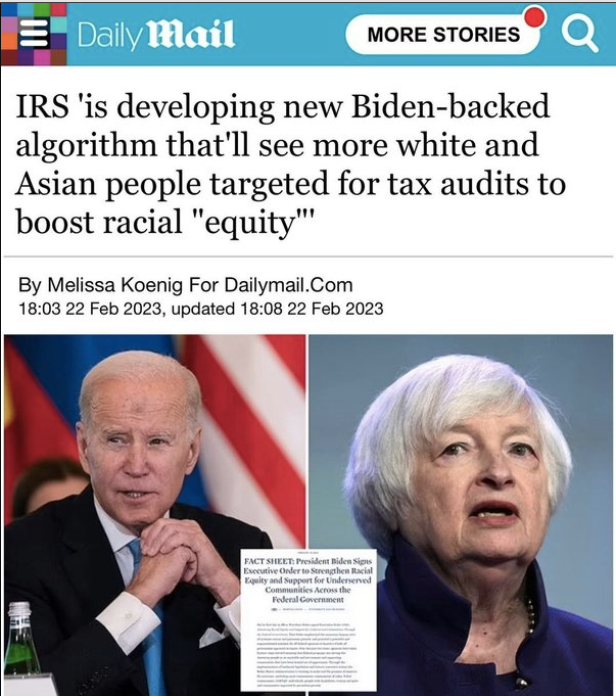
I mentioned this Baseball issue yesterday, had no idea it would take this sort of bad bounce.

If he is non-binary it implies there is only binary, otherwise it is a distinction with no difference. Also, when did even more alphabets get added? I hate the fact that with each timeline bump I wind up with more alphabets to keep track of.
I thought this was interesting, given how much the "hack" theme has played here.
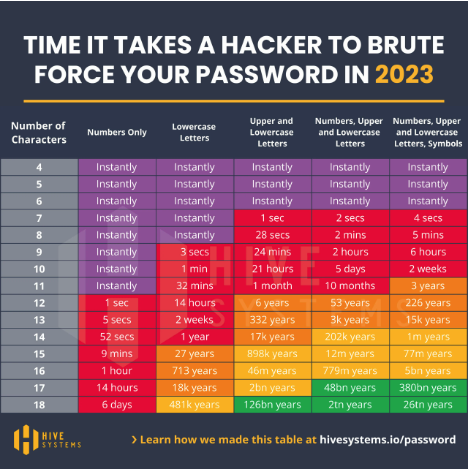
Bigger
Side note. I've never seen this before, in my lifetime ... in this timeline I guess to be clear. The information the Jab is coming out, and it is ugly of course, but what I see is folks stabbing everyone in the back over it. So DeSantis, who seems to be running as the foil for DJT, meaning he'll lose to make it seem it was fair, and folks are attacking his Rona Response..... With hindsight acquired weaponry!!!
Folks did this with DJT, and now are doing it worse with him and others. I used to have a joke with my friend, he'd be watching a soccer match and say "wft didn't he just shoot?" My response was "look idiot, you're sitting 50 feet up, from the comfort of your couch, your POV isn't his, you're the viewer, he's the player."
The fact that each and every single one knows exactly, to the crossed "T" and dotted "I" exactly how DJT should have handled things is astounding, as they sit from 50 feet up from the comfort of the couch which does not require them to make choices in a Polarity Reality, where the Polarities are only Rock and Hard Place.
Politicos relied exclusively on their staff, and "experts" which they are now finding out lied to them at best. No politico had 8 hours a day to scan the internet for contrary "conspiracy theory" information to then trot out in order to be crucified by the fear monger press minions and those living in abject fear of The Rona living in swimming pools and falling from tree leaves.
Do not judge this mess in hindsight, it was much much much bigger than anyone can possibly comprehend = Choice Points are simply not fathomable on mass.

When is racism not racism, when it's not racism, but equity, which isn't racism, but equity.

I mentioned this Baseball issue yesterday, had no idea it would take this sort of bad bounce.

If he is non-binary it implies there is only binary, otherwise it is a distinction with no difference. Also, when did even more alphabets get added? I hate the fact that with each timeline bump I wind up with more alphabets to keep track of.
I thought this was interesting, given how much the "hack" theme has played here.

Bigger
Side note. I've never seen this before, in my lifetime ... in this timeline I guess to be clear. The information the Jab is coming out, and it is ugly of course, but what I see is folks stabbing everyone in the back over it. So DeSantis, who seems to be running as the foil for DJT, meaning he'll lose to make it seem it was fair, and folks are attacking his Rona Response..... With hindsight acquired weaponry!!!
Folks did this with DJT, and now are doing it worse with him and others. I used to have a joke with my friend, he'd be watching a soccer match and say "wft didn't he just shoot?" My response was "look idiot, you're sitting 50 feet up, from the comfort of your couch, your POV isn't his, you're the viewer, he's the player."
The fact that each and every single one knows exactly, to the crossed "T" and dotted "I" exactly how DJT should have handled things is astounding, as they sit from 50 feet up from the comfort of the couch which does not require them to make choices in a Polarity Reality, where the Polarities are only Rock and Hard Place.
Politicos relied exclusively on their staff, and "experts" which they are now finding out lied to them at best. No politico had 8 hours a day to scan the internet for contrary "conspiracy theory" information to then trot out in order to be crucified by the fear monger press minions and those living in abject fear of The Rona living in swimming pools and falling from tree leaves.
Do not judge this mess in hindsight, it was much much much bigger than anyone can possibly comprehend = Choice Points are simply not fathomable on mass.
After reading this, I have to think about a particular -Q- post.
From: New York Post
Now down in the article is this piece:
This had me thinking back to Q-137, and all the banks listed. While that list given in Q-137 seemingly has nothing to do with the countries that were giving Hunter and Joe cash, one is left wondering if there is a bigger connection between the whole banking shuffle and the World Banking System.
From: New York Post
IRS supervisory agent Gary Shapley spent about six hours Friday privately testifying to Congress about an alleged coverup in the criminal investigation of first son Hunter Biden.
Now down in the article is this piece:
Hunter Biden reaped millions of dollars from overseas ventures that Republicans call influence-peddling during and immediately after his father’s vice presidency.
Wealthy figures in China, Kazakhstan, Mexico, Romania, Russia and Ukraine are counted among Hunter’s past clients and associates. Many of the dealings remain murky, though details were chronicled in files from Hunter’s abandoned laptop and in bank files acquired this year by the House Oversight Committee.
Hunter wrote in emails retrieved from his former laptop that he had to share “half” of his income with Joe Biden and records show that the elder Biden met with many of his son’s partners and even appeared to be penciled in for a 10% cut of proceeds from a Chinese government-linked partnership under negotiation in 2017.
This had me thinking back to Q-137, and all the banks listed. While that list given in Q-137 seemingly has nothing to do with the countries that were giving Hunter and Joe cash, one is left wondering if there is a bigger connection between the whole banking shuffle and the World Banking System.
new topics
-
Sick sick sick
Other Current Events: 49 minutes ago -
Comcast dumping MSNBC
Mainstream News: 3 hours ago -
President-elect TRUMP Picks MATT GAETZ for his ATTORNEY GENERAL - High Level PANIC Ensues.
2024 Elections: 7 hours ago -
Mike Tyson returns 11-15-24
World Sports: 11 hours ago
top topics
-
Breaking: FBI Agents Raid Polymarket CEO After Betting Site Predicts Trump Win
General Conspiracies: 13 hours ago, 18 flags -
The Guardian quits Elon Musk's X social media platform
Mainstream News: 13 hours ago, 16 flags -
US warship Edsall Lost after Pearl Harbor Attack Found 80 Years Later ... by Accident
Mainstream News: 17 hours ago, 14 flags -
Thune selected as Senate Republican Leader
US Political Madness: 16 hours ago, 13 flags -
HHS Spent Hundreds of Millions of Dollars on DEI Initiatives Under Biden, Watchdog Finds
US Political Madness: 12 hours ago, 11 flags -
Band of Brothers 2001 Classic
Television: 16 hours ago, 7 flags -
President-elect TRUMP Picks MATT GAETZ for his ATTORNEY GENERAL - High Level PANIC Ensues.
2024 Elections: 7 hours ago, 7 flags -
Comcast dumping MSNBC
Mainstream News: 3 hours ago, 6 flags -
Mike Tyson returns 11-15-24
World Sports: 11 hours ago, 4 flags -
Sick sick sick
Other Current Events: 49 minutes ago, 0 flags
active topics
-
Sick sick sick
Other Current Events • 1 • : Freeborn -
Elon's Starlink Stole The Election For Trump--Leftist Conspiracy Theorists Charge
General Conspiracies • 35 • : Owlwatcher -
How can you defend yourself when the police will not tell you what you did?
Posse Comitatus • 64 • : SprocketUK -
Should we look for the truth, or just let it go?
US Political Madness • 103 • : Lazy88 -
WATCH LIVE: US Congress hearing on UFOs, unidentified anomalous phenomena
Aliens and UFOs • 35 • : Lazy88 -
Comcast dumping MSNBC
Mainstream News • 2 • : berbofthegreen -
Breaking: FBI Agents Raid Polymarket CEO After Betting Site Predicts Trump Win
General Conspiracies • 19 • : billxam1 -
60s-70s Psychedelia
Music • 52 • : Flyingclaydisk -
Mike Tyson returns 11-15-24
World Sports • 14 • : angelchemuel -
President-elect TRUMP Picks MATT GAETZ for his ATTORNEY GENERAL - High Level PANIC Ensues.
2024 Elections • 36 • : putnam6

